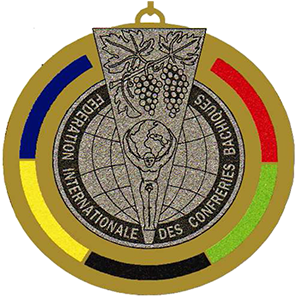The Wine Information Council (W.I.C.) is a partnership between various scientific, academic and expert bodies in Europe and beyond that are dedicated to research on wine and its impacts on health and society, and organisations committed to promoting moderation and responsibility in wine consumption.
The W.I.C. is one of the three pillars of the “Wine in Moderation – Art de Vivre” programme, an international network with which the F.I.C.B. established a partnership in 2016, which has led, among other things, to the publication of a joint guide on “responsible wine tasting”.
site of Wine in Moderation: www.wineinmoderation.eu
Click here for the site of the Wine Information Council: www.wineinformationcouncil.eu
Click here for the “guide on responsible wine tasting”
The conference was presented by Professor Nicolai Worm, a nutritionist from Munich, President of the Wine Information Council.

After a review of the publications on the subject of wine and COVID 19, he concluded that :
- no negative impact of moderate wine consumption can be associated with the current pandemic.
- an in vitro study shows that the polyphenols present in wine prevent the virus from attaching itself to human cells, but the result is not established in vivo.
- There are not yet enough studies on the effect of alcohol consumption on the effectiveness of vaccination to draw any conclusions whatsoever.
Below is a summary of this conference prepared by the W.I.C. itself:
1. ALCOHOLIC BEVERAGES AND THE IMMUNE FUNCTION
- Consumption of alcoholic beverages can influence the immune system through multiple mechanisms, altering both innate and adaptive (*) immune function.
- The vast majority of research on alcohol and immune function and risk of infectious diseases is conducted on chronic heavy drinkers or people with alcohol use disorders.
- Heavy drinkers are more susceptible to pneumonia and to bacterial and viral respiratory infections.
- Binge drinking may also suppress immune response, but this response appears to be temporary.
- In comparison, very few studies have been conducted among light and moderate drinkers.
- Moderate drinking has been associated with either no risk or decreased risk of respiratory infections in some studies.
- To date there is no/insufficient evidence demonstrating an increased risk of infection associated with light or moderate drinking.
(*) The innate immune response is the immediate responder part of the immune system and is non-specific to an invading pathogen, whereas the adaptive system is activated in response to a specific pathogen or antigen; it can recognize and immediately defend against a previously encountered pathogen, but it can also be activated by the innate immune response.
2. 2. DOES WINE DRINKING (ALCOHOL / POLYPHENOLS) HELP FIGHT COVID-19 ?
- In in-vitro studies, it was shown that polyphenols (flavanols, proanthocyanidins) in grapes and wine prevented the SARS-CoV-2 virus from attaching itself to human cells. This was only one study related to SARS-CoV-2 virus and it was an in-vitro study.
- The results cannot be extrapolated to humans, need yet to be repeated in animal and human studies.
- It was shown in animal studies that the spreading of the flu virus, NOT the SARS-CoV-2 virus, could be prevented by blocking its enzyme.
- Some wine phenolic compounds can prevent the multiplication of the Mers-virus (another corona virus but not SARS-CoV-2 virus), prevent the attachment or invasion in the host cell.
- Some (wine) polyphenols destroy the synthesis or composition of the genetic material or the shell of viruses.
- Flavonoids in wine could stop the advancement of the flu and limit its symptoms. A possible mechanism may be that wine polyphenols influence the immune system through the gut microbiota.
However, whether these mechanism work against the Covid-19 virus in vivo in humans has not been studied/shown in appropriate studies!
3. DOES WINE CONSUMPTION MAKE COVID-19 VACCINATION INEFFECTIVE ?
- There is very limited research on light or moderate consumption of wine/alcoholic beverages and immune response to vaccines.
- A small number of animal and human studies have examined the effect of alcohol consumption on the immune response following vaccination – however, no studies have been published so far on alcoholic beverages and response to a COVID-19 vaccine !
- Some indication exists that moderate consumption of alcoholic beverages may assist the immune response to the vaccine, potentially through an anti-inflam- matory effect of the wine polyphenols, however, there is an insufficient amount of research to form a conclusion.
Some basic research with wine polyphenols has been conducted in a Petri dish but it is not possible to transfer these results to humans. Further animal and human studies need to be carried out.






